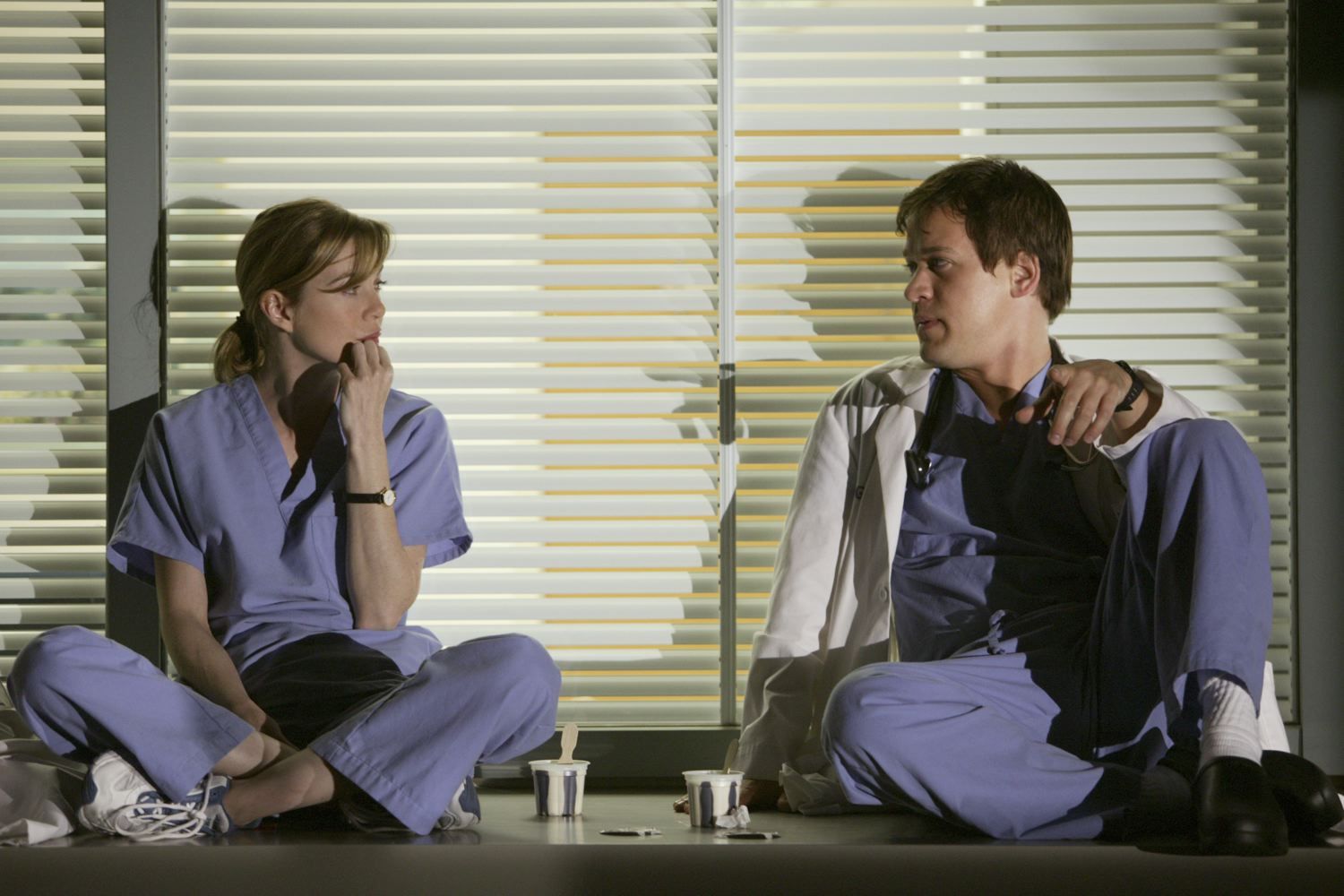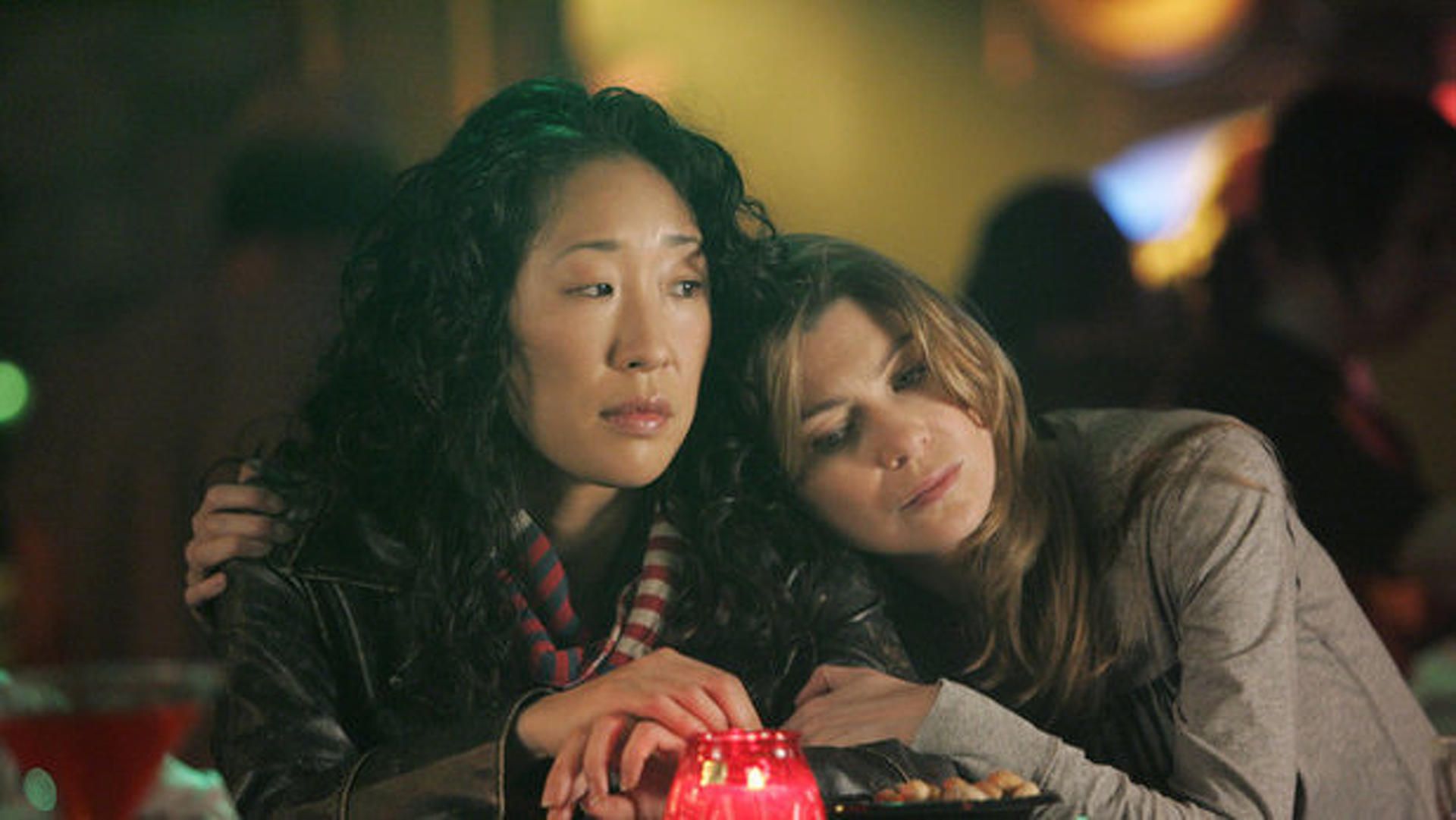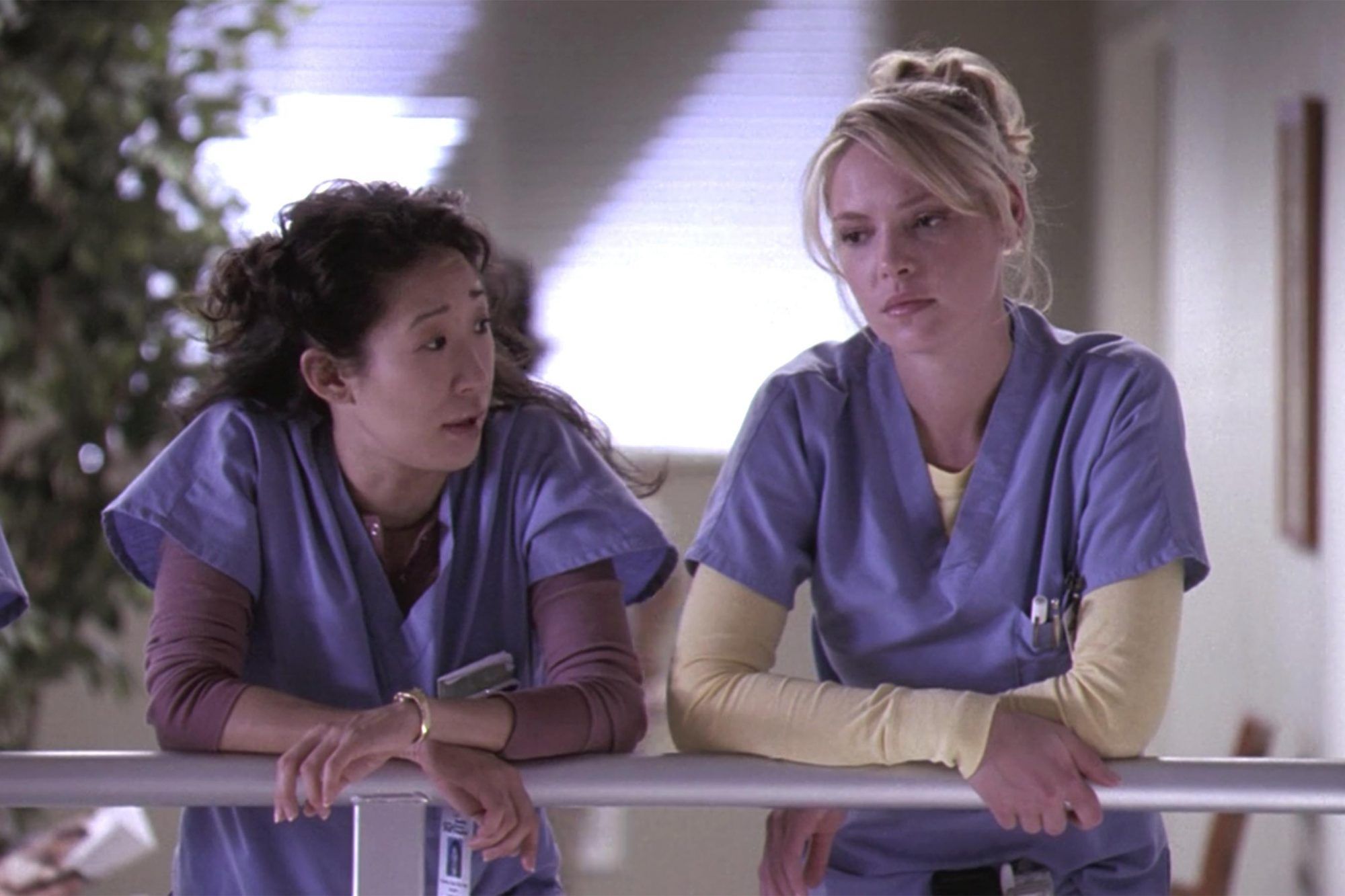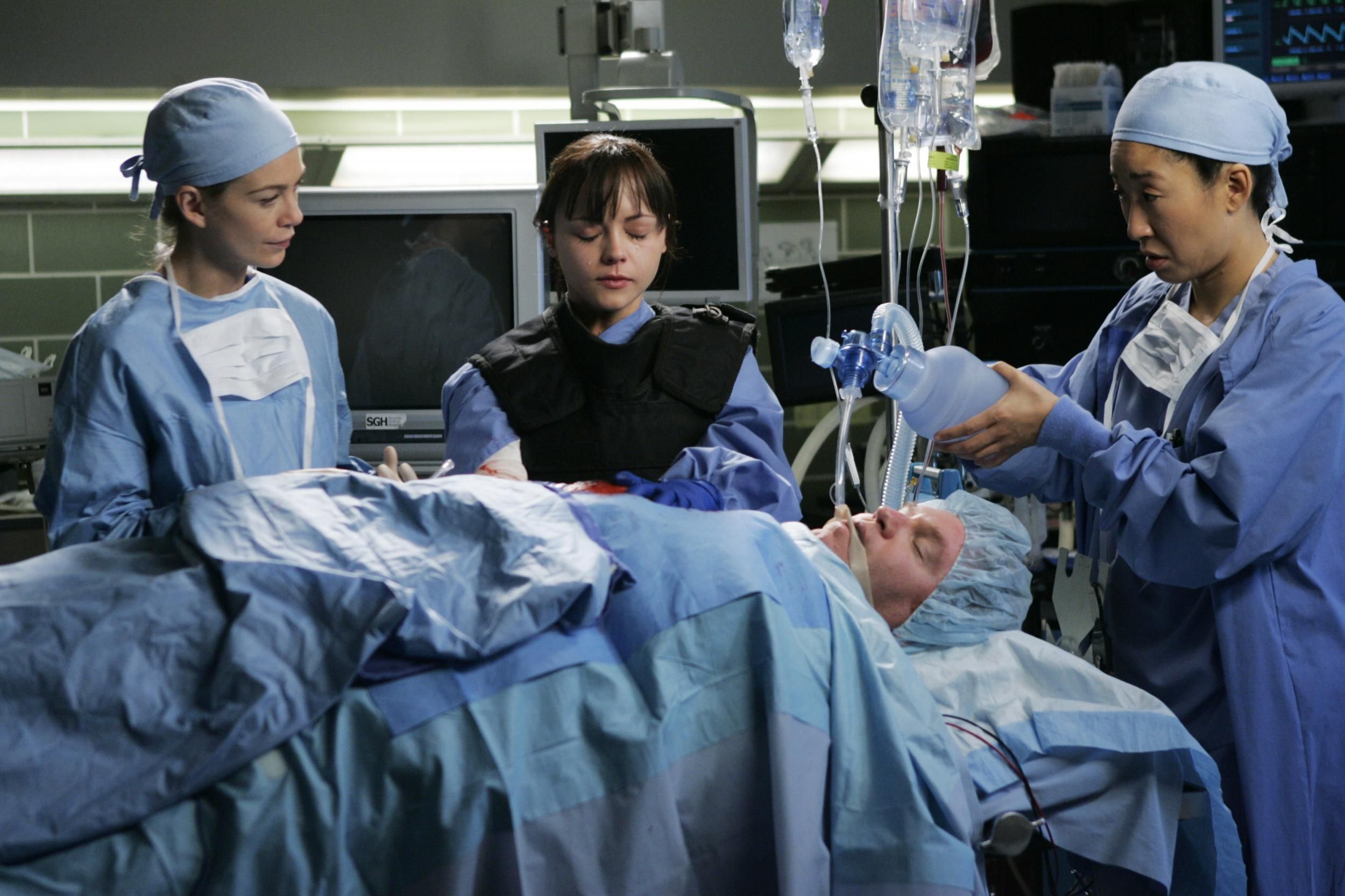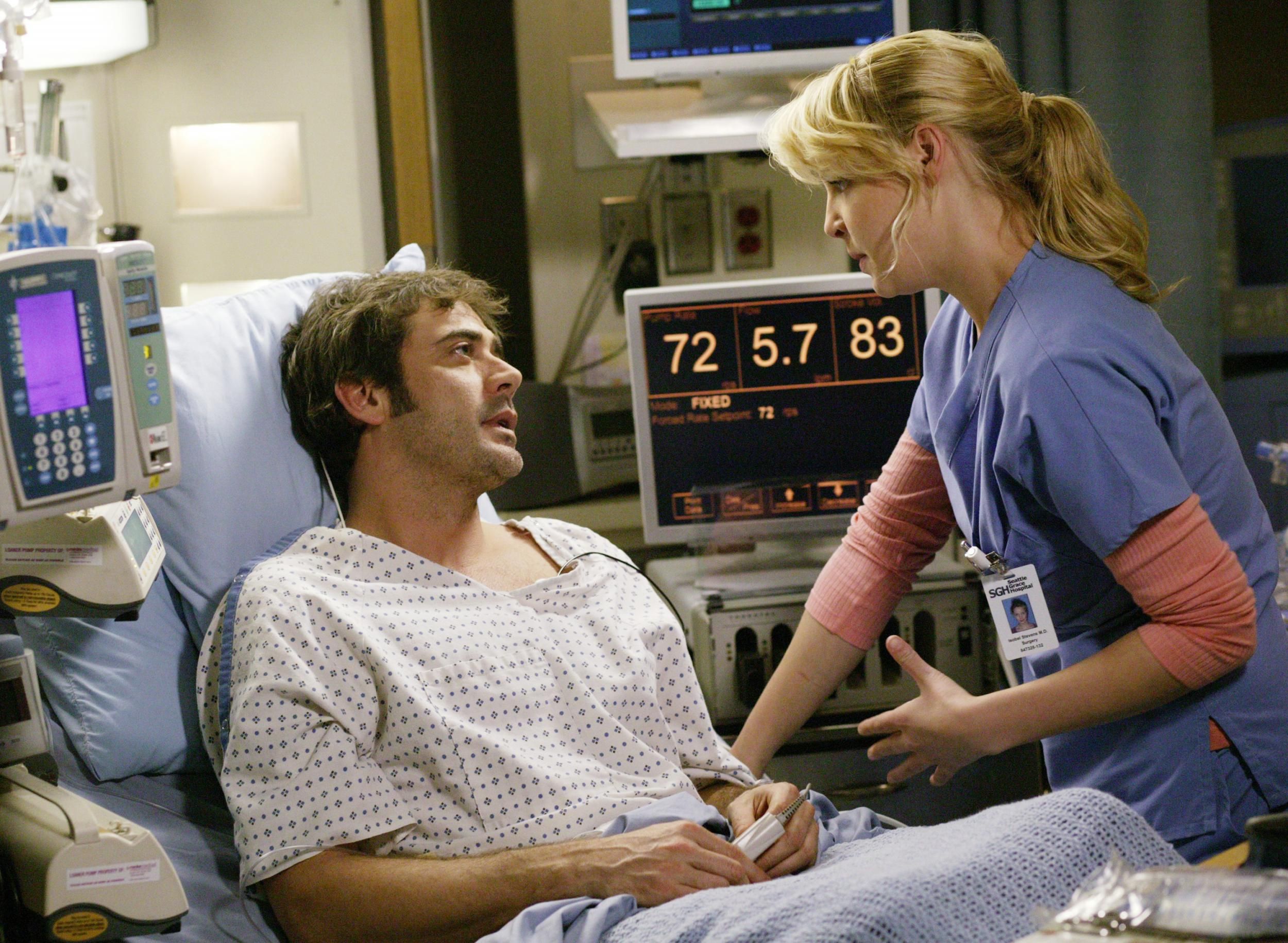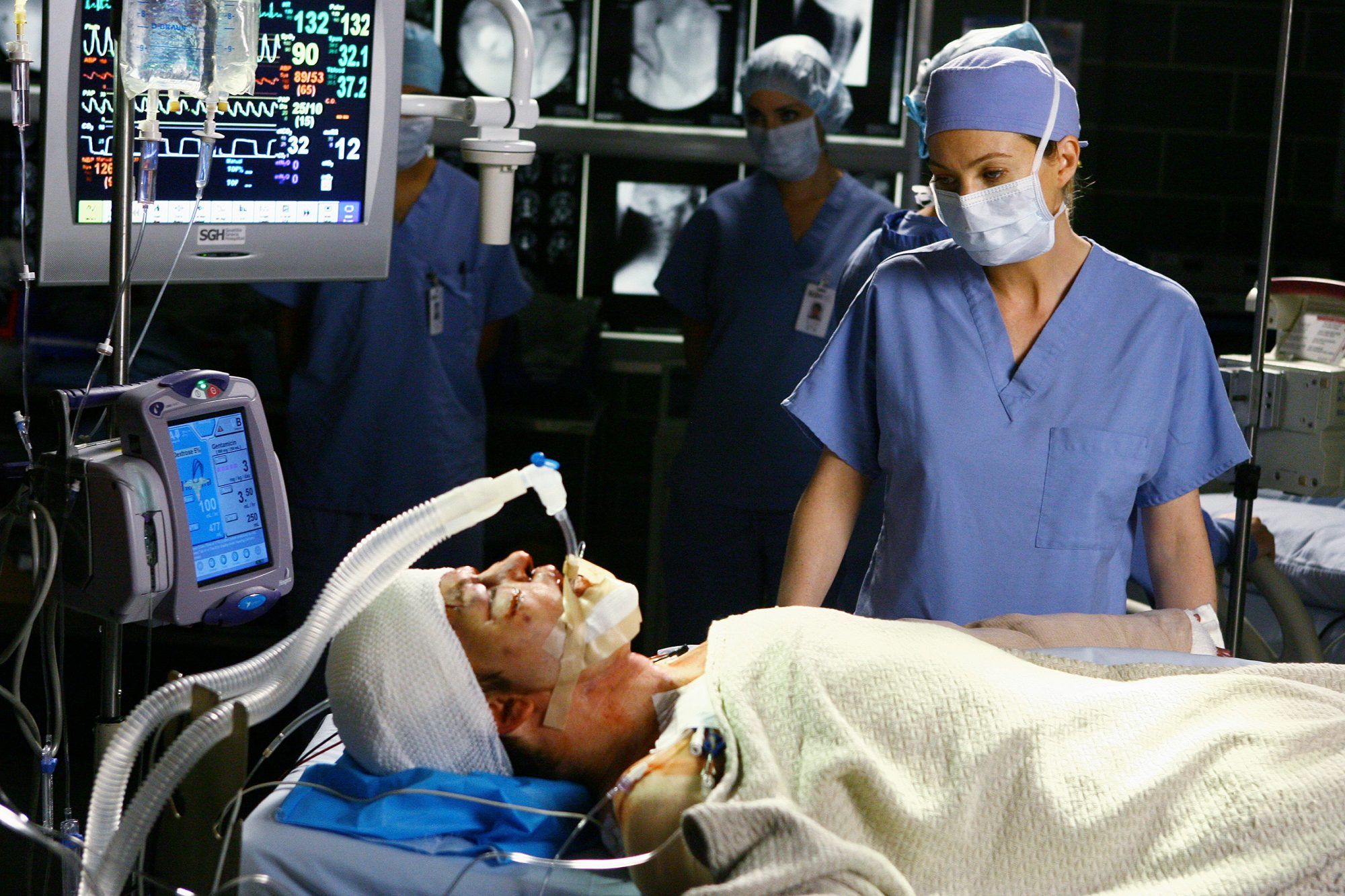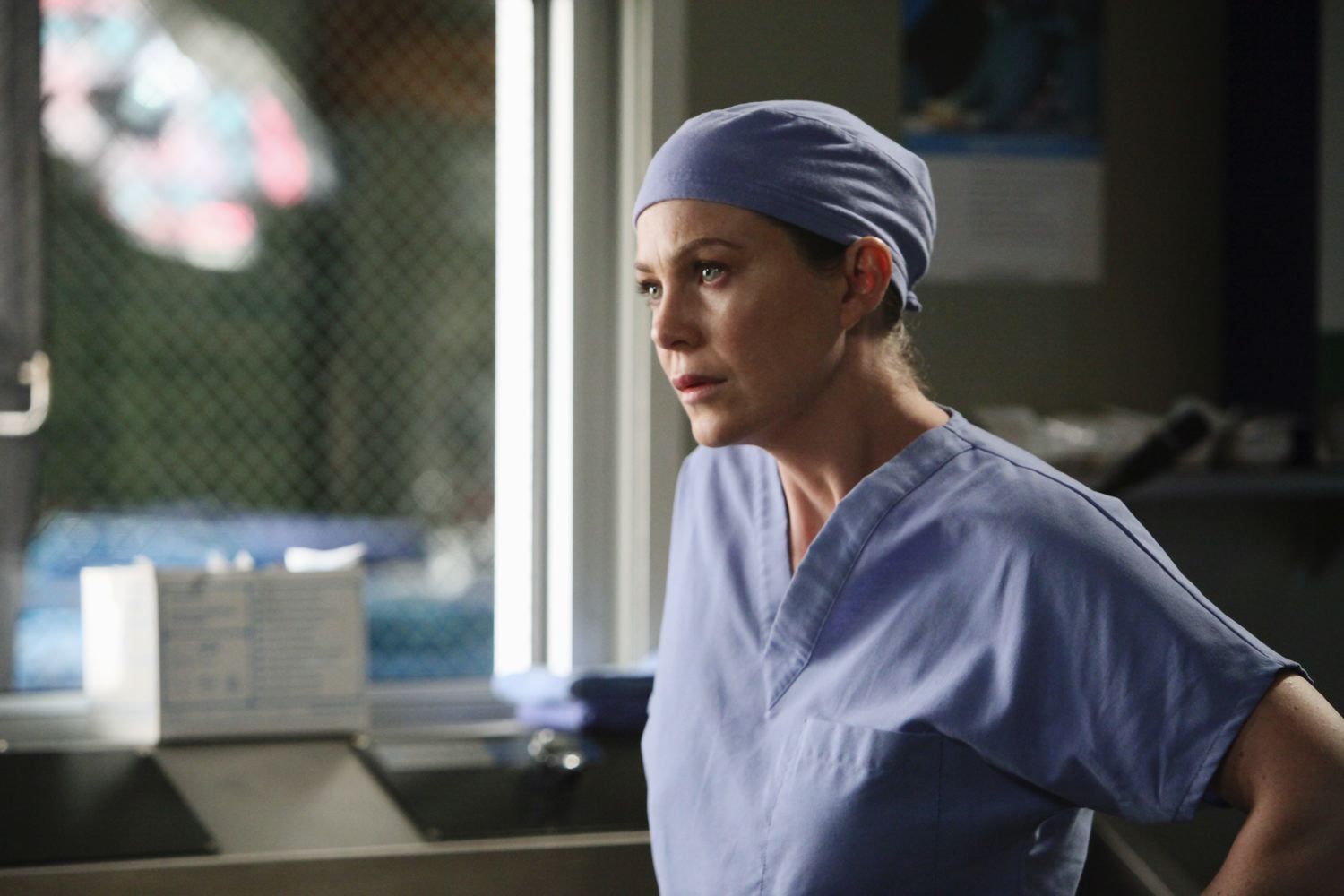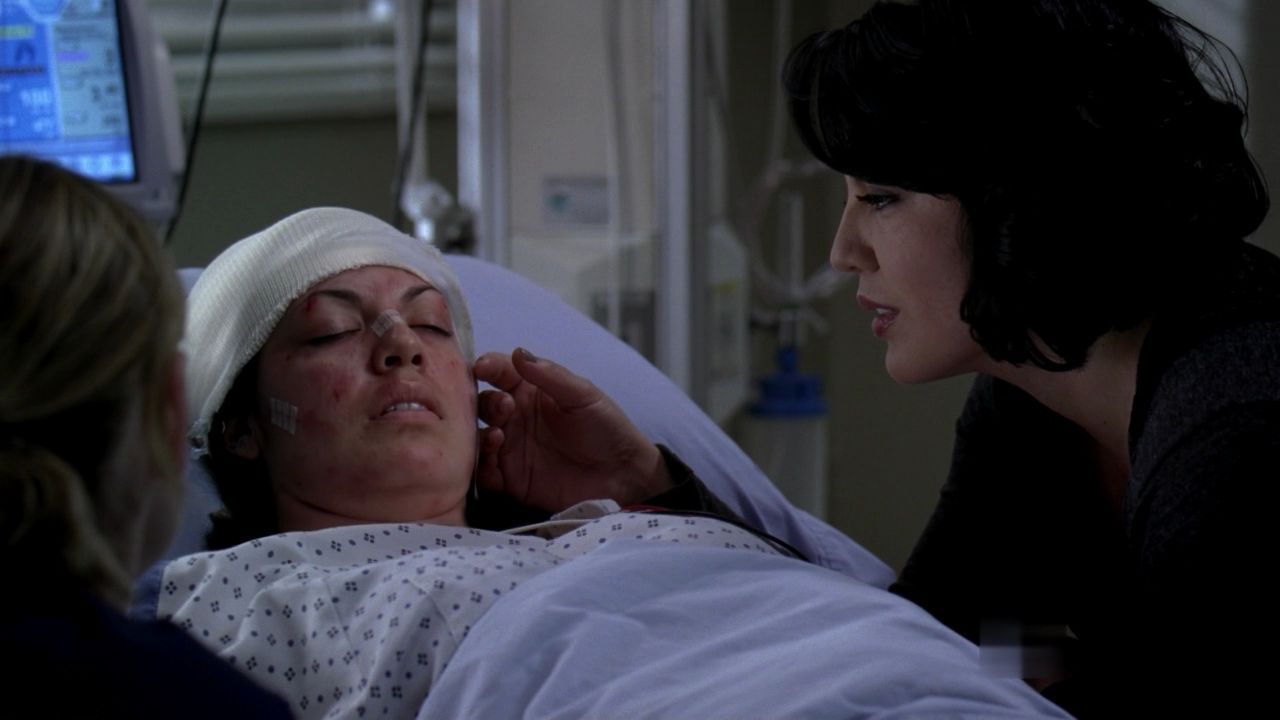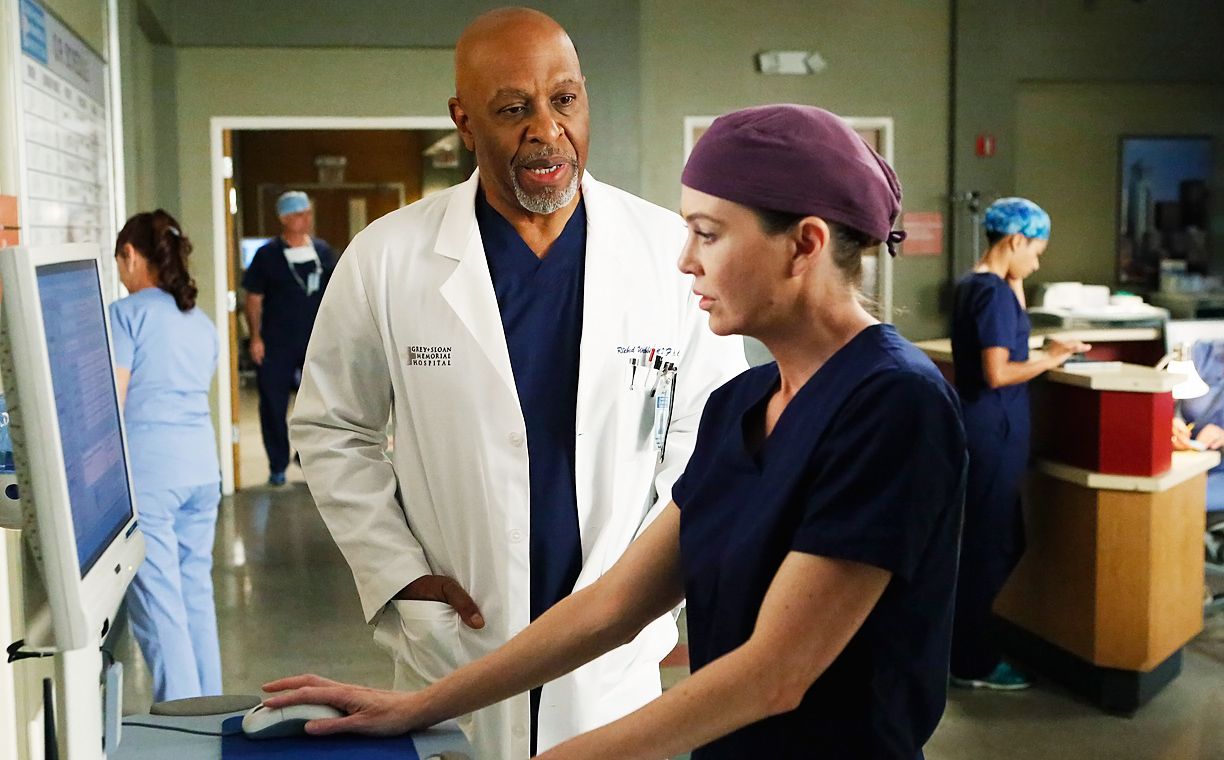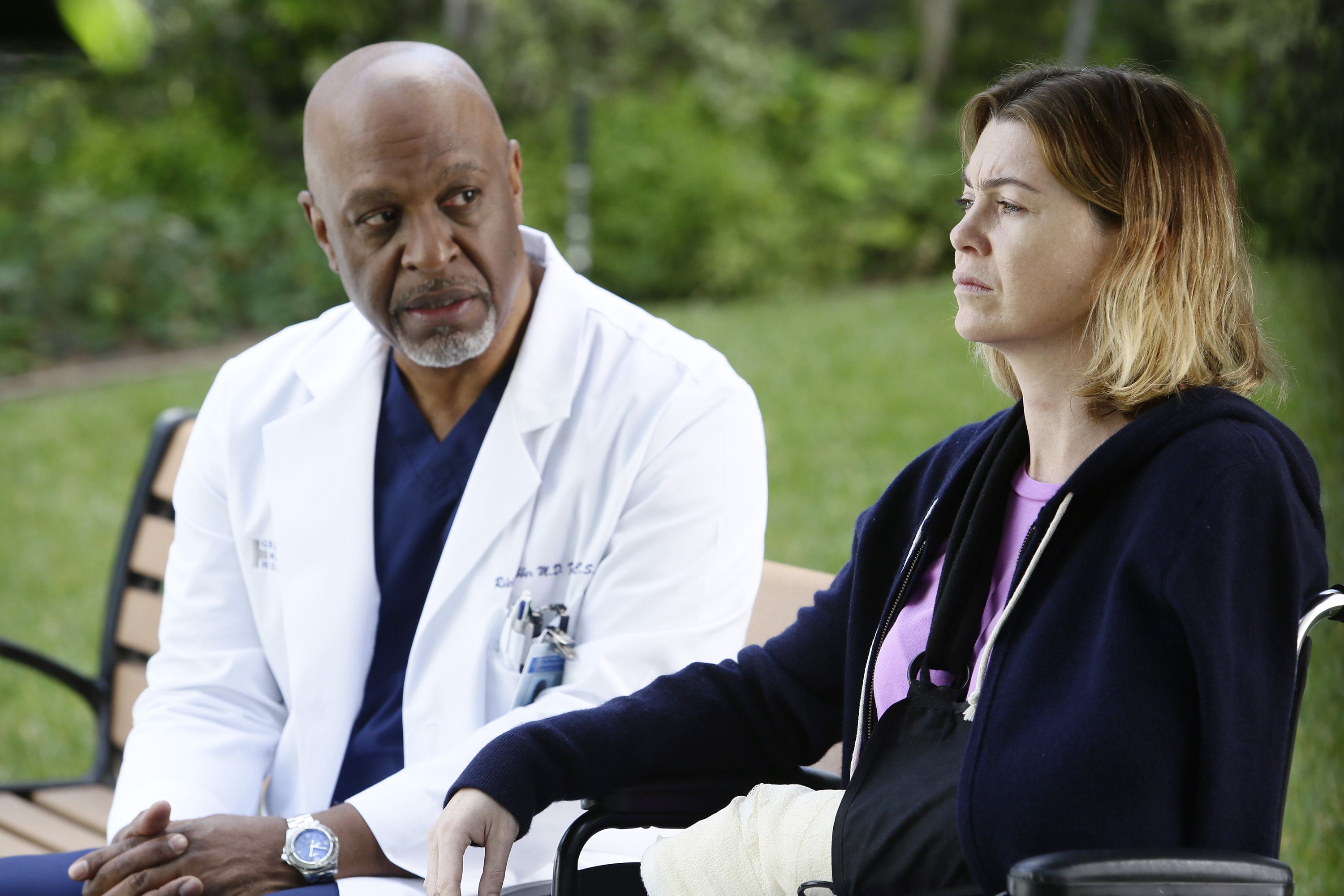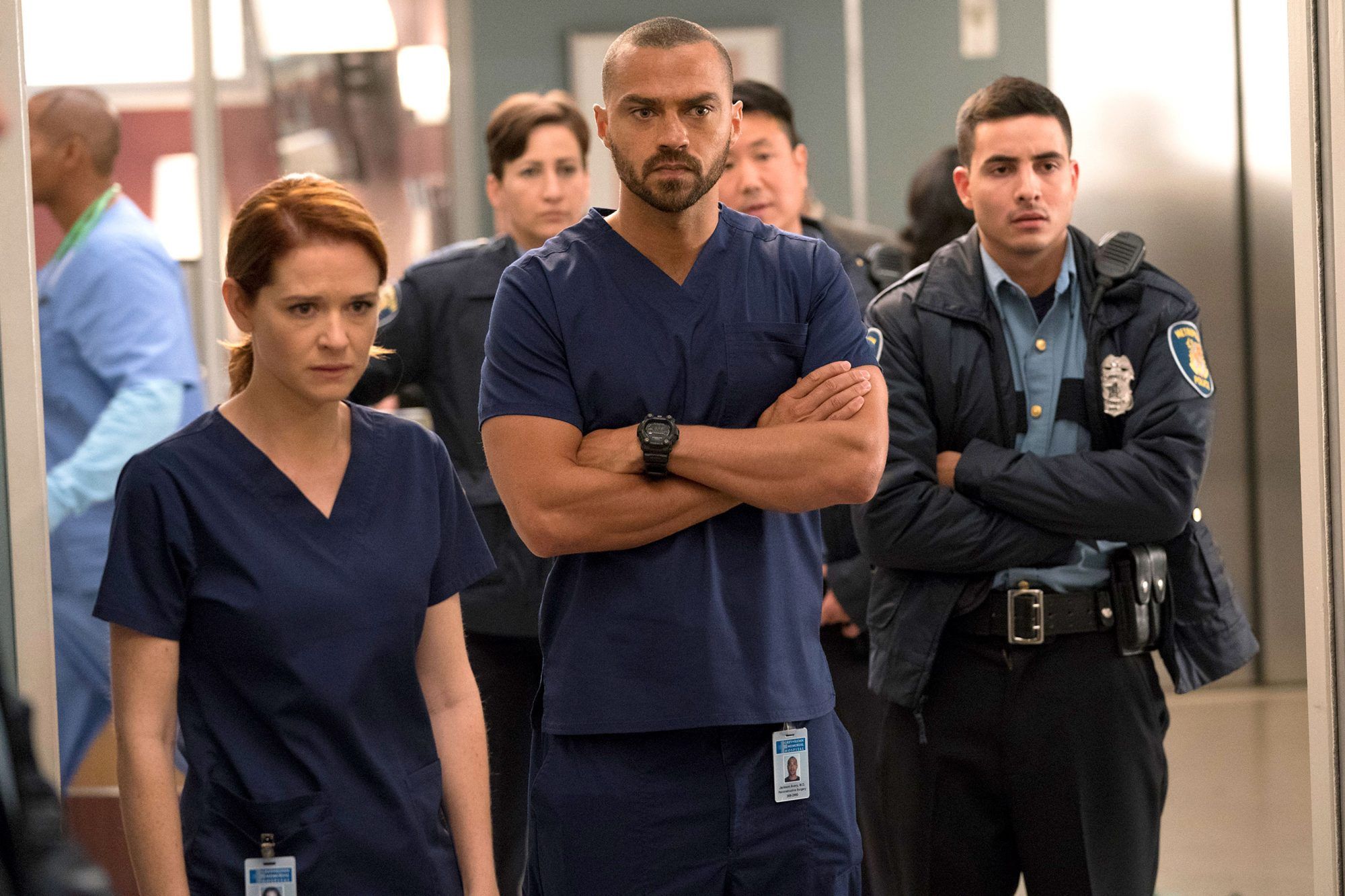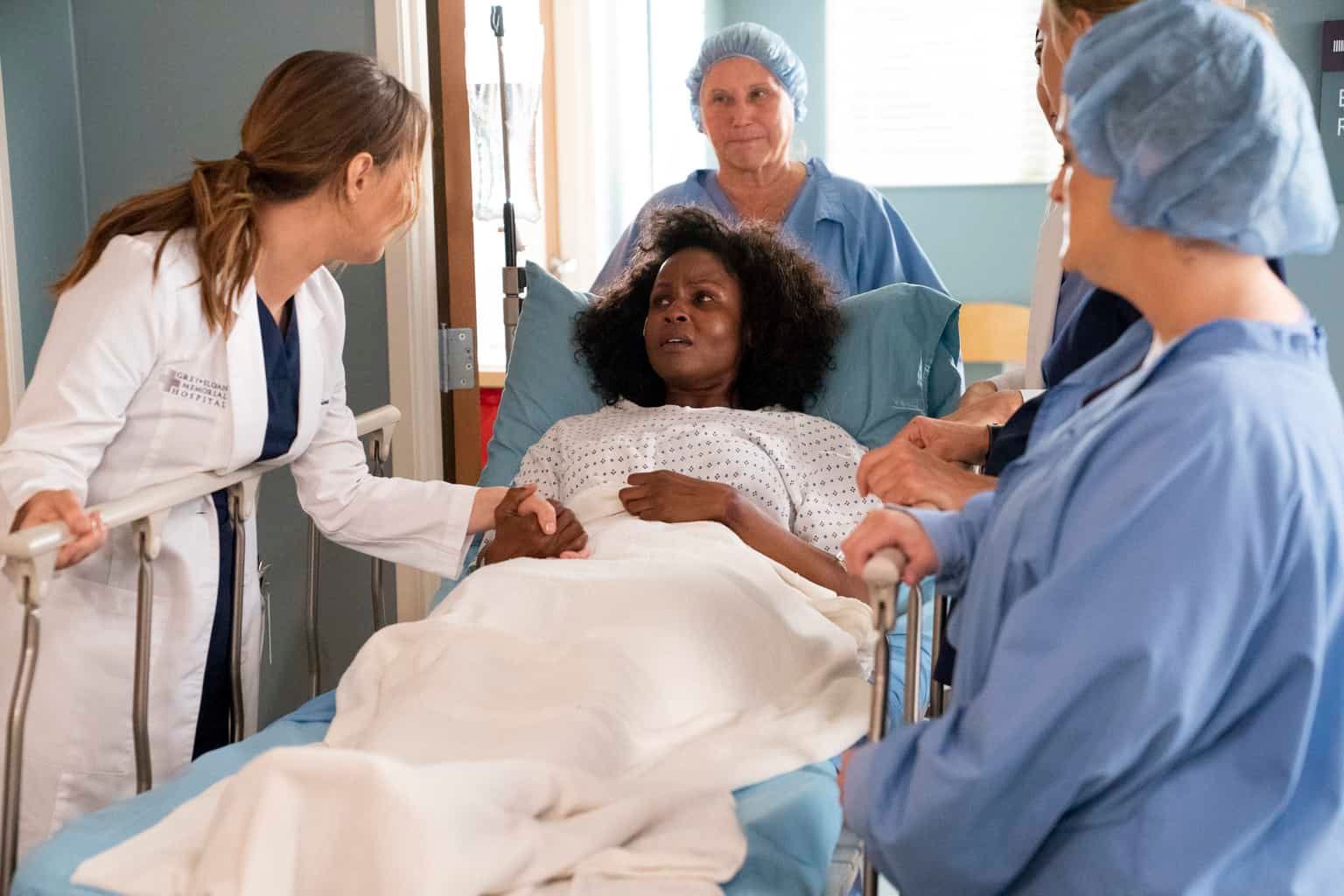Grey's Anatomy is well into its seventeenth season of television, and the juggernaut medical drama will celebrate its Sweet 16 on March 27. Premiering in 2005, the long-running series has been through myriad changes over its 16 years on the air, including the evolution of its themes and plotlines, and the gradual rotation of most of its cast, so that the faces now seen each week on our TV screens are largely not the same ones viewers met during the show's first season.
In the beginning, Grey's Anatomy was mostly known for its focus on steamy (and often illicit) romantic relationships, the fiercely competitive atmosphere among the doctors of Seattle Grace Hospital, and how the “medical part of its genre designation was really just a mechanism to deliver the all-caps DRAMA. It was also notable for the visible diversity of its cast — especially for 2005 — which included multiple people of color in prominent roles, as well as an emphasis on making sure the background actors were equally diverse, something that was important to creator Shonda Rhimes from the get-go.
Over time, though, as tends to happen, Grey's Anatomy evolved into a show that still resembles what it was in its youth, but has grown and matured into something that is different in many ways from what it once was. As Grey's Anatomy comes of age this year (and possibly approaches its finish line?), it's worth looking back at the moments and storylines that helped one of the most influential shows of the 21st Century explore and discover its own identity. This list doesn’t necessarily include the most popular or memorable episodes (although some of those are in here), but it does feature the ones which best encapsulate the essence of Grey's Anatomy — what it has been, and what it has become.
"A Hard Day's Night" (Season 1, Episode 1)
Grey's Anatomy no longer has much in common with its pilot episode, which centered around a group of eager young surgical interns each hoping to distinguish themselves on the first day of their surgical residency, but even though much has changed since Meredith Grey first entered the halls of Seattle Grace Hospital in 2005, "A Hard Day's Night" is still the entry point to the show and as such, the first impression anyone ever got of what Grey's Anatomy was all about. The episode introduced viewers to Meredith Grey (Ellen Pompeo), Cristina Yang (Sandra Oh), Alex Karev (Justin Chambers), Izzie Stevens (Katherine Heigl), and George O'Malley (T.R. Knight), the intern class who served as the central characters for the show's first few seasons. It also established the doctors tasked with teaching them, including Miranda Bailey (Chandra Wilson) and Richard Webber (James Pickens Jr.), both of whom are still on the show today, and Derek Shepherd (Patrick Dempsey) — quickly dubbed "McDreamy" — who would go on to become the love of Meredith Grey's life and half of one of TV's most iconic couples.
The medical cases in the episode (a tricky aneurysm, a disastrous appendectomy) mostly serve to ground the doctors in the world of the hospital, set up the idea of the Seattle Grace team as creative problem solvers with the ability to think outside the box, and establish the reputation of the attendings as surgical rockstars, showcasing their quick intellect and precise skills. The episode also laid groundwork for the epic romance between Meredith and Derek, introducing the pairing as an impulsive one-night-stand that would eventually grow into the beating heart of the series. Ultimately, it's not the plot lines from the pilot that proved central to the identity of Grey's Anatomy, but the relationships and dynamics between the characters, which helped lay the groundwork for everything that came after.
"Raindrops Keep Falling on My Head" (Season 2, Episode 1)
Season 2 of Grey's Anatomy started with a bang — or more accurately, a crash, as Joe the bartender (Steven W. Bailey) collapses early on from what turns out to be a sizable aneurysm. Derek is confident he can operate on it, but as a self-employed business owner without health insurance, Joe worries that the ridiculously expensive procedure will ruin him. Unable to ignore Joe's financial concerns like some of his more experienced peers, George goes against the instruction of Richard Webber and spends time looking into a financial loophole that will cover the cost of the procedure. Eventually, he finds it, donating Joe's body to science for the duration of the procedure, during which time Joe will be functionally dead. Joe lives, and is relieved to learn upon awakening that survival isn't going to bankrupt him after all.
The storyline with George and Joe is a notable one in the history of Grey's Anatomy for a couple of reasons. Although neither character is around anymore, the episode was an early example of the show highlighting the high cost of healthcare in the U.S., which would turn out to be an ongoing theme of the series. While Grey's Anatomy has always been more about the medicine than the finances, it has regularly worked to remind viewers that healthcare in the U.S. is not free, and important decisions about people's health are often influenced more by their wallets than science. Additionally, George bucking his boss and mentor in order to follow his own moral compass would also prove to be a central tenet of the series, with many other characters following in his ethical footsteps in the years to come.
"Raindrops Keep Falling on My Head" also makes the list for another reason — the first utterance of what would become Meredith and Cristina's iconic phrase, "You're my person." The original context is Cristina designating Meredith as her emergency contact on the paperwork for an abortion clinic (although the pregnancy would turn out to be ectopic, requiring emergency surgery). Considering Cristina's private nature, she hasn't wanted to tell anyone what she's going through, but since she's required to tell someone, Meredith is the one she decides she can trust with her sensitive story.
"You're my person" would go on to become one of Grey's Anatomy's most memorable phrases, coming back repeatedly not just to describe Meredith and Cristina's friendship, but other important relationships on the show as well. It also infused popular culture, used to describe a connection somewhere between a best friend or even a soulmate — someone who innately gets you, will always be in your corner, and on whom you can rely above all others.
"Bring the Pain" (Season 2, Episode 5)
Likely best known for being the episode where George performs open-heart surgery in an elevator, "Bring the Pain" definitely features one of Grey's Anatomy's more memorable and unorthodox medical procedures. Yet while it's true that both memorable elevator experiences and risky operations would become bold fibers running through the fabric of Grey's Anatomy, "Bring the Pain" makes the list largely for a single scene, and it has nothing to do with medicine. After working for most of the episode to convince both herself and Derek that she's not emotionally invested in whether Derek decides to divorce Addison (Kate Walsh), Meredith eventually realizes that she's lying.
Cornering Derek after performing a surgery, Meredith confesses that she's in love with him and wants him to leave Addison for her. This is the episode of one of Grey's Anatomy's most famous speeches (in a series known for speeches and grand gestures), which culminates in Meredith's heartfelt plea to "pick me. Choose me. Love me."
Of course, as even the most casual of Grey's Anatomy watchers know, while Derek and Meredith continue to go through their ups and downs following this episode, they do ultimately choose to be together, and their relationship continues to strengthen until Derek's eventual death many years later. It's an important moment that helped define Grey's Anatomy's position that love is a choice, and often a hard one, which is ultimately about more than simple chemistry and affection, but about vulnerability and trust and both communicating and meeting the needs of the other person. Ironically, it's a high bar that most of Grey's Anatomy's power couples wind up failing to meet, which we'll get to in a minute.
"It's the End of the World," "As We Know It" (Season 2, Episodes 16-17)
The two-part bomb-in-a-body arc that began with a man who accidentally shot himself with a homemade bazooka and ended with Kyle Chandler's Bomb Squad Guy exploding into pink mist all over Meredith is probably still one of the most well-known Grey's Anatomy storylines, and for good reason. Not only are both episodes fraught with tension and powerful performances from recognizable guest stars (in addition to Chandler, Christina Ricci also makes an appearance as a traumatized paramedic), but they also serve the function of helping establish Meredith Grey's low-key death wish, which becomes a recurring theme for the show.
It's not so much that Meredith wants to die as that she often reacts to dangerous situations by inserting herself into them — in this episode, by literally inserting her hand into a patient's chest in order to hold the bomb in place. It helps define her worldview of herself as a sacrificial savior, who will always throw her body on the bomb (again, literally in this case) if she believes it will save others. Yet the episodes also argue that Meredith's life is itself valuable, not just in how she can help others, but solely because she is a person with inherent worth.
As the central character for whom the show is named, Meredith's worldview is arguably also that of Grey's Anatomy itself, which constantly has its characters risking their health and careers for the good of others, sometimes with destructive repercussions, while also working to remind viewers that those characters are still human beings with their own value outside of their medical expertise.
"17 Seconds" (Season 2, Episode 25)
Izzie's love story with the doomed Denny Duquette (Jeffrey Dean Morgan) provided one of Grey's Anatomy's most memorable love stories, despite its short duration, but the part of their star-crossed journey that was most defining to the show itself was the episode in which Izzie takes it upon herself to steal Denny a heart by cutting his LVAD wire. Early in the episode, Denny is notified that he's finally been matched with a donor heart, but when that organ proves nonviable, Dr. Burke (Isaiah Washington) winds up competing with a rival surgeon for the other available match. In order to move Denny to a higher priority status on the transplant list and therefore make him eligible to claim the heart, Izzie destroys the device keeping him alive, confident that once Burke performs the transplant operation, Denny will be fine and her actions will be justified.
Of course, this being Grey's Anatomy, everything with this plan goes wrong in a tremendously dramatic fashion (which is itself a defining feature of the show), with Burke getting shot in the parking lot before he can assess Denny's status and claim the heart. But it's not really Denny's fate that helped contribute to the developing identity of Grey's Anatomy, but Izzie's actions. Unlike George's attempts to find an outside-the-box legal solution to Joe's financial problems earlier in the season, Izzie violates both the law and her oath as a doctor in order to get Denny his heart. It won't be the last time that doctors on Grey's Anatomy literally operate outside the law, trusting their own sense of right and wrong above all else, but this was an episode that characterized the show as one that believes that rules and boundaries exist for a reason — though sometimes, even if there are severe consequences, those rules are worth breaking.
"Now or Never" (Season 5, Episode 24)
Most of the plot of the fifth season finale of Grey's Anatomy isn't particularly memorable, outside of three things: the near-death of Izzie Stevens, the post-it note marriage of Meredith and Derek, and the actual throwing-under-a-bus of George O'Malley. Throughout Season 5, Izzie battled with an aggressive form of melanoma, which gave her only a slim chance of surviving. In "Now or Never," Izzie has survived her risky brain surgery, but has awakened without the ability to form new short-term memories. Meanwhile, George — after being noticeably sidelined for most of the season — decided to depart the hospital to join the army, and while he takes the day off, his friends spend the episode organizing an intervention to convince him to change his mind.
In the final moments of the episode, Izzie crashes shortly after triumphantly regaining her memories, and Meredith realizes that the disfigured John Doe she's been treating for the whole episode is actually George, who got hit and dragged by a bus off-screen after heroically pushing a stranger to safety. The episode ends with Izzie's team ignoring her Do Not Resuscitate order and attempting to revive her, while George's team heads into surgery.
At the beginning of Season 6, of course, we learn that George has died and Izzie has survived, although she doesn't remain on the show for much longer after recovering from her illness. While Grey's Anatomy flirted with death among its main cast in earlier episodes, and killed off some notable guest stars, "Now or Never" was the first time the series committed to killing one of its own, even if we didn't find out until the following season. It was a pivotal moment in the series, communicating that no one is safe, not even original cast members who were at one point among the central characters on the show.
Meanwhile, before Meredith has her awful realization about who her John Doe really is, she and Derek spend the episode searching for a window of time to go get officially married. Eventually, due to their busy schedules, they give up and decide to simply make a written contract between them on a post-it, agreeing to love each other forever, even when they hate each other. It's an unorthodox solution that feels uniquely suited to the two of them, and helps demonstrate how on Grey's Anatomy, tradition and ceremony don't matter nearly as much as genuine emotion, and the bonds those feelings forge between people.
"Sanctuary," "Death and All His Friends" (Season 6, Episodes 23-24)
Grey's Anatomy has no shortage of disaster episodes of both the natural and man-made variety, but none seems grander than the mass shooting that makes up the two-part Season 6 finale. In the riveting pair of episodes, which play out almost like a movie, a bereaved widower nursing a grudge against Derek Shepherd and several other doctors for taking his wife off of life support earlier in the season wanders the hospital with a gun, using his grief as an excuse to shoot and terrorize doctors, nurses, and patients. Over the course of the episodes, multiple people are killed, including several established recurring characters, while series regulars Derek, Alex, and Owen (Kevin McKidd) are shot, and numerous characters have to work through grief, terror, and the immense pressure to save their friends and colleagues even as they fear for their own lives.
It's a taut, suspenseful storyline punctuated by devastating scenes of heartbreak (Bailey's meltdown when she realizes she can't save one of her residents is particularly gutting) and triumph (Jackson Avery (Jesse Williams) rising to the occasion and helping Cristina save Derek's life). And even though all of the main cast members survive, the immense loss of life still weighs heavily over the series for a long time to come. It is the beginning of showing how trauma is more than something you live through; it's something you live, with scars etched deep into your soul for a long time after the event has passed.
The episodes are also an effective commentary on the epidemic of mass shootings that have been plaguing the United States for years, centering around a white, male gunman who purchased his gun just a few days before at a superstore, with extra ammunition because it was on sale. At one point, he tries to absolve himself by telling Lexie Grey (Chyler Leigh) that he didn't mean to kill so many people, and that he had intended to only kill the doctors that were on his wife's case, as if mass murder is a thing that just kind of happens by accident. His argument rings hollow to both the characters in the show, who lost their friends, and to viewers, who watched the calculated way the shooter picked off innocent people with his gun. In tackling a mass shooting and the trauma of the aftermath on Grey's Anatomy, the series demonstrated not only its willingness to wade into the important topics of our time, but to tackle them head-on with a distinct viewpoint and message.
"Song Beneath the Song" (Season 7, Episode 18)
While Grey's Anatomy's famous musical episode (some would say infamous, but this writer is not among them) is not particularly significant in terms of its plot or character development, it's on the list for the simple fact that it is a musical. Granted, being a musical is hardly part of Grey's Anatomy's identity outside of this one episode (which came about largely as an excuse to showcase the vocal talents of Tony Award-winning actress Sara Ramirez, who played Callie Torres), but music has always been central to the storytelling of Grey's Anatomy, and in "Song Beneath the Song," it steps into the spotlight instead of remaining in the background.
Yes, important things happen in the episode, including the birth of Callie's baby and the engagement of Callie and Arizona Robbins (Jessica Capshaw), but most of the plot happenings in "Song Beneath the Song" are largely just devices to get us from Song A to Song B. The songs chosen for the episode, performed by many of the cast members, consisted of covers of songs that appeared prominently during the series run, including "How to Save a Life" by The Fray (which was featured in the Season 2 episode "Superstition" and also in the Season 3 promotional material), and "Chasing Cars" by Snow Patrol (which featured prominently into the Season 2 finale after Denny Duquette dies). Aside from being an excuse to reveal to the audience that some of Grey's Anatomy's cast members have impressive voices (and that some, regrettably, do not), "Song Beneath the Song" was the episode that best exemplified how important music has always been and would continue to be to the identity of Grey's Anatomy.
Case in point: when Alex Karev and Jo Wilson (Camilla Luddington) get married by Meredith Grey at the end of Season 14, the song that plays behind the long-awaited wedding is none other than Sara Ramirez's cover of Brandi Carlisle's "The Story" which also closes out "Song Beneath the Song." As Callie's voice sings over the happy couple, Meredith talks about the importance of love and finding your people, which is really what Grey's Anatomy has always been about.
"White Wedding" (Season 7, Episode 20)
There have been a lot of weddings throughout Grey's Anatomy's history, but the one that feels the most defining when it comes to the character of the show is the union of Callie and Arizona, who got engaged just two episodes prior. Over the course of the episode, it becomes clear that while both brides' parents have arrived in Seattle for the wedding, the Torreses are not both on board with the nuptials. Eventually, Callie's Catholic mother declares that she can't support the marriage due to her religious beliefs and decides to leave.
That Callie and Arizona do still get married — and that at least Callie's father decides to show up after all — isn't the reason that this episode is on the list, though. While the frilly, traditional white wedding of two women was indeed a significant milestone for the flagship prime time show on one of TV's biggest networks, the aspect of the episode that stands out as integral to Grey's Anatomy's identity is in how it balances its lesbian wedding with its religious characters. Previously, in the Season 6 episode "Invasion," Callie gave her father an impassioned speech full of Bible verses to rebut his religious objections to her relationship. In "White Wedding," not only has Mr. Torres been persuaded by her argument, but Callie has a heart-to-heart with Bailey in which Miranda tells her that her mother and church "just haven't caught up to God yet" in their beliefs. "White Wedding" is a prime example of Grey's Anatomy using its large and established platform to break new ground in how it depicts difficult real-world issues, and doing so with care and nuance, something the show has continued to lean into as it has progressed.
"White Wedding" also introduces the character of Zola, a six-month-old orphan from Malawi who arrives at Seattle Grace Mercy West in need of an operation to treat her spina bifida. Over the course of treating Zola, Derek and Meredith decide to adopt her, which helps mark the beginning of an era of Grey's Anatomy in which Meredith and her peers start embracing parenthood. While the series began with most of the characters as single professionals laser-focused on their careers and libidos, now, more of the residents and attendings on Grey's Anatomy have children than not. While we still don't see those kids in every episode, Meredith's decision to move onto the next phase of her life in "White Wedding" wound up marking the beginning of a shifting and more mature focus for Grey's Anatomy as well.
"Flight" (Season 8, Episode 24)
Grey's Anatomy certainly enjoys putting its characters through the wringer, and perhaps no episode has been harder on more of its main cast members than the Season 8 finale, "Flight," which follows the aftermath of a plane crash involving many of the show's central characters. Meredith, Derek, Cristina, Lexie, Arizona, and Mark Sloan (Eric Dane) find themselves stranded in the woods amidst the wreckage of the plane that was supposed to carry them to Idaho for a tricky surgery. They're all in various stages of distress, and one of Grey's Anatomy's more shocking plot twists comes early in the episode, when Meredith's sister Lexie succumbs to her injuries and dies a mere 16 minutes in.
Of course, that's not the end of the repercussions of "Flight." In the Season 9 premiere, Mark Sloan — Derek's best friend, who was in love with Lexie — also passes away. Meanwhile, Derek and Arizona both sustain severe injuries that follow them long after they're rescued, and Cristina experiences severe PTSD around flying. And perhaps most significant of all, after the deaths, is how the events of the episode lead directly to the survivors of the crash eventually buying the hospital and renaming it Grey Sloan Memorial after the two that they lost.
Even though most of it takes place outside the hospital, "Flight" makes the list because the only reason it works as well as it does is that it leans so fully into what makes Grey's Anatomy Grey's Anatomy. It's not just about plane crash survivors lost in the woods; it's about surgeons lost in the woods. And it's not just about injured doctors having to MacGyver their own treatment; it's about friends who are more like family having to literally piece each other back together with safety pins. It's an episode that contains all sorts of distinctly Grey's Anatomy tropes and themes, presented in an unexpected way and cranked up to 11, and it's defining because it proves just how far the show can go when it pushes itself.
"Fear (of the Unknown)" (Season 10, Episode 24)
Despite the hospital around which the world of Grey's Anatomy revolves at one point being nicknamed "Seattle Grace Mercy Death" by the doctors who worked there, not every long-time cast member who leaves does so in a body bag. And in the case of Cristina Yang, sometimes they even get to leave with a sense of immense accomplishment and even triumph. "Fear (of the Unknown)" serves as Cristina's swan song, her last hurrah before she heads off to take over Dr. Burke's job as the Director of Cardiothoracic Surgery at the Klausman Institute for Medical Research in Zurich, Switzerland.
After spending the episode treating survivors of a gas explosion at the mall, Meredith nearly has to shove Cristina into a cab in order to get her to leave, refusing to be swayed by Cristina's plethora of excuses about why she needs to stay just a bit longer. Finally, Cristina admits that she doesn't feel finished in Seattle: not with her career, or her romance with Owen, or her friendship with Meredith. But ultimately, Cristina does get her closure by returning to "dance it out" one last time with her Person. Before she goes for good, she imparts a few last words of affirmation to Meredith, culminating by telling her that Derek is "very dreamy, but he's not the sun. You are."
Interestingly, while Grey's Anatomy has exited its main cast members in all sorts of ways — through career changes, cross-country moves, bizarre reconciliations with long-gone exes, and of course, its fair share of deaths — the series has never killed off a main cast member of color. It's probably not something that most viewers will pick up on, but after 17 seasons and five main character deaths, it does feel like the decision to always allow the characters of color to leave with dignity — or in Cristina's case, even celebration — is a conscious one.
"All I Could Do Was Cry" (Season 11, Episode 11)
Possibly one of the most heartbreaking episodes Grey's Anatomy has ever filmed, "All I Could Do Was Cry" centers around recent newlyweds Jackson Avery and April Kepner (Sarah Drew), who are forced to make the impossible decision to deliver their much-wanted infant son at 24 weeks, after learning that he has an untreatable condition that will cause him tremendous suffering in the womb if carried to term, and would in all likelihood kill him shortly after delivery anyway. But because they're delivering the baby for the purposes of letting his parents hold him for just a little bit before he dies, and not to attempt to save him, the procedure is considered an induction termination — terminology which April, a devout evangelical Christian, finds deeply offensive.
"All I Could Do Was Cry" provides a tender, intimate look at a couple going through an agonizing experience. The fact that it centers a pro-life Christian choosing what, in common parlance, would be called a late-term abortion is perhaps the best example of Grey's Anatomy using its impressive platform to tackle hot-button issues that other shows wouldn't touch with a ten-foot pole, and doing so not to be incendiary, but to show the human side of these topics with empathy and compassion. April's faith offers an anchor for her throughout the episode, and it is largely because of that faith that she's able to find the strength to go through with the delivery of her son, whom she and Jackson name Samuel.
Outside of the storyline on the show, the episode is also significant because April's pregnancy arc was written in response to Sarah Drew's real-life pregnancy. Drew actually pitched April's storyline to Shonda Rhimes, saying she based it on an experience of one of her mother's friends. It also highlights one of the show's practices to be accommodating to working mothers and parents, with the series routinely either writing in cast members' pregnancies or covering them up through clever blocking, rather than reducing their participation in the show. Both on and off the screen, "All I Could Do Was Cry" serves as an example of the many ways Grey's Anatomy uses its voice and its position to advance important conversations about and for women.
"How to Save a Life" (Season 11, Episode 21)
After playing one half of Grey's Anatomy's most iconic couple for more than a decade, Patrick Dempsey decided in Season 11 that it was time for him to move on, which in turn meant that Derek Shepherd had to die. Despite multiple other couples coming together only to eventually separate over the course of the show, MerDer gave every indication they were in it for the long haul. Not only did they have two children together, but after years of marriage, they still showed that they were willing to work through difficulties and mend arguments, making them the rare Grey's Anatomy couple where death really was the only viable way to drive them apart.
Derek's final episode saw him serving as a hero one last time, as he pulled over to help victims of a serious car accident on a blind turn. Unfortunately, after they'd been transported away in an ambulance, Derek himself was struck by a truck while preparing to leave the scene. He still could've made it, though, if the closest hospital had been prepared to take in severe trauma, or if the on-call neurosurgeon was more prompt in answering his pager. To twist the knife just a little more, Derek also serves as partial narrator of the episode, pointing out every bit of malpractice in his treatment that eventually leads to Meredith being forced to make the call to remove him from life support.
"How to Save a Life" is integral to the identity of Grey's Anatomy for a few reasons. Not only is it a tragic farewell to one of the most central characters on the show, which fundamentally changed how Meredith moved through the world for every episode that followed, but it also highlighted just how skilled the surgeons of Grey Sloan Memorial actually are. By painfully walking us through every misstep in Derek's treatment at a lesser hospital — which is later underscored by Meredith's pointed comments about the subpar treatment her husband received — it drives home how fortunate the patients of Grey Sloan are to have such a competent team of surgeons helping them through their hardest moments.
"The Sound of Silence" (Season 12, Episode 9)
Although "The Sound of Silence" begins like just another typical case-of-the-week episode of Grey's Anatomy, it quickly becomes anything but. When a patient experiences a seizure that causes heightened aggression, he brutally attacks Meredith, causing severe injuries that temporarily impair her hearing and require her jaw to be wired shut, preventing her from speaking. Meredith spends weeks stuck in a silent hospital room, initially unable to hear, and even once she regains that sense, unable to talk.
During that time, she observes all the little events taking place at the hospital that she normally wouldn't notice, allowing her to see some of her friends in a different light. By the end of the episode, which spans several weeks, her voiceover explains what she's learned about the power of using her voice. "Don't let fear keep you quiet," Meredith urges viewers. "You have a voice. So use it. Speak up. Raise your hands. Shout your answers. Make yourself heard. Whatever it takes. Just find your voice and when you do, fill the damn silence."
It probably doesn't even need explaining why an episode that includes that call to action belongs on a list of episodes that best showcase the defining characteristics of Grey's Anatomy. If there's one thing that has been consistent on Grey's Anatomy from day one, it's that it's not afraid to speak.
"Unbreak My Heart" (Season 12, Episode 11)
While Grey's Anatomy clearly believes in the power of friendship, loyalty, and love, it doesn't make a very strong case for the institution of marriage. With very few exceptions, most Grey's Anatomy couples that have gotten hitched over the course of the show have eventually gotten divorced, although admittedly, many of those divorces have come on the heels of significant trauma. Jackson and April are no exception, with their marriage crumbling in the months following their son's death, but the way that Grey's Anatomy explores the disillusion of their union makes this episode particularly poignant.
"Unbreak My Heart" jumps back and forth through time, all the way back to the first day of the couple's residency at Mercy West, mirroring the pilot episode of Grey's Anatomy. It shows many of the pivotal moments of April and Jackson's friendship and eventual romance, including a number of little encounters set during the course of the series that we never previously got to see. But between each scene of the two realizing that they are each other's person, are scenes showing their relationship slowly falling apart in the wake of their son's death. By the end of the episode, it's abundantly clear that these two deeply love each other, and have also deeply hurt one another. Yet in a classic Grey's Anatomy twist, in the final moments of the episode, after the divorce papers have been signed, April reveals to Arizona that she's actually pregnant from an encounter with Jackson a few weeks before.
More than any of the other episodes that have explored the end of romances and marriages, "Unbreak My Heart" really drives home one of Grey's Anatomy's consistent themes that love isn't always enough, especially in the face of extreme hardship. It also makes it clear — mostly through the lack of these things in Jackson and April's relationship — that partnerships take commitment and sacrifice in order to survive, sometimes more than either party can reasonably give. These are themes Grey's Anatomy has been exploring since the very beginning, making them fundamental to the show's point of view and what it works to communicate to its audience.
"Silent All These Years" (Season 15, Episode 19)
Most of the defining moments during Grey's Anatomy's long run took place in the first half of its life, which is understandable. While the show has matured and shifted focus over the years, it didn't need a decade and a half to figure out what it was or what it wanted to say. Yet as Grey's Anatomy grew up, it gradually became bolder and more confident in figuring out its message, and how it wanted to use its voice and its platform. One of the most effective examples of the show's commitment to using its sizable influence to speak truth into difficult topics came in Season 15, with "Silent All These Years."
The episode jumps back and forth in time, finally revealing what happened when Jo went to visit her birth mother several episodes prior, while also walking through Jo's current storyline in treating a patient who is a victim of sexual assault. Through the alternating narratives, we learn that the reason Jo was given up for adoption was because she was conceived through rape, and that learning the truth about her birth has traumatized her ever since.
However, Jo's personal experience and her mother's story helps inform how she engages with her patient. Aided by Teddy (Kim Raver), Jo is able to make the hospital a safe space for the patient, emphasizing consent as Teddy performs a rape kit, staffing the OR with an all-female surgical team, and lining the halls with women as they wheel their patient into the operating room as a show of support and solidarity. Later in the episode, we see Bailey's husband Ben Warren (Jason George) having a serious talk with his stepson, Tuck (BJ Tanner) about consent.
It's a powerful episode that doesn't attempt to soften or sugarcoat the ugliness of sexual assault, or the intense trauma that is experienced by the victims. It pulls no punches while working to convey a large amount of information to viewers, including what the signs of sexual assault look like and the toll it takes on victims to officially report a rape, making it abundantly clear why so many don't. Yet it is extremely gentle in how it tells the stories of its survivors, centering their experience with compassion and empathy.
"Silent All These Years" is a prime example of how Grey's Anatomy has always attempted to use the medium of TV and the setting of a medical drama to tell stories that, between all the professional competition and romance and over-the-top scenarios, also say something important about the world we live in. As the show has aged and its platform has grown, its voice has also become stronger, louder, and more articulate. Leaning into relevant real-world issues has always been part of the fabric of Grey's Anatomy, but over time, those threads have become far more vibrant than they once were.
Grey's Anatomy has always been a show about friendship, romance, and family; the thrill of medical discovery and the joy of helping people; the pain of loss, the scars of trauma, and the hope of healing, just as it's always been a show about using what voice you have to speak up about the things that matter most to you. The longer the show has existed, the more it's embraced its own complex identity as many things at once — soapy and cheesy, romantic and steamy, opinionated and powerful, tense and heartbreaking, snarky and fun, ambitious and fierce. With the series turning 16 this year, it feels safe to say that Grey's Anatomy hasn't so much changed over the years as it has evolved into a more fully realized version of what it always was. The question going forward, then, isn't really about what defines Grey's Anatomy — truthfully, we've known that for years — but what it will decide to do next.


